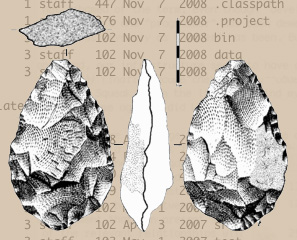Among others, Light Table, Code Bubbles, Squeak, and Bret Victor‘s Inventing on Principle talk make me ponder where we’re going as programmers. Yes, I’m not ashamed of the term, even though developer is the currently-fashionable word and programmer has been demeaned by popular mis-use (though not as severely as hacker). But I digress.
On one hand, our infrastructure seems to have developed to the point that we may finally escape the limiting code-as-text-files model. On the other hand, Squeak is in the list to remind myself that Smalltalk got there a long time ago (as did Lisp).

I regard the core challenge of programming as organizing actionable abstractions in a way that I can (re)establish the appropriate context for thinking about them. I regard code complexity as a matter of how much I must keep in my head to understand each single line I examine. Combining those ideas with an infrastructure that can build or retain connections across the code base, between code and helpful narratives, we can envision an environment that can present small, meaningful units of code and keep all of the relevant relationships within immediate reach.
There’s a curmudgeonly voice in the back of my head that tries to connect this possible trend to the warning signs that we live in an increasingly post-literate society that appears to value immediate experience over the patient accumulation of understanding (dare I say wisdom?)
But that is balanced by a hopeful voice that looks to the potential of our tools as a useful response to the increasing complexity and volume of information (and stimuli) with which we must deal.
Sunglasses can filter out harmful UV wavelengths while passing usable light. Spam filters (when they work) filter out contaminants while passing on more useful voices. But these carry the implicit assumption that the hide/view distinction is in principle a static one (even if the learning is dynamic).
But in programming, I need the ability to redefine that distinction constantly, based on the needs of the current task. Better yet, I need a way for the distinction to emerge implicitly from what I do moment by moment. The environments mentioned above seem aimed at affording us that dynamic focusing and filtering ability.
I want to highlight one other property shared by Light Table, Code Bubbles, and the demos of Inventing on Principle, because I believe it crucial to success. Those tools were quite willing to meet us where we are today, with support for programming languages already in widespread use.
The idea of a game-changing way to deal with code is not new. But some of the previous attempts have led to isolationist viewpoints that seemed to ask us to throw away all of our exiting code assets and re-think everything in the new language to which the new platform was tied. (FORTH, I’m looking at you.) That’s fine for students and researchers who focus on learning or producing new ideas, but industry and business demand new tools to connect with what they already have and do. A measure of rework may be necessary, tolerable, or even good, but total displacement is seldom survivable.
Programming is an incredibly conservative industry, especially compared with the exponential advances in hardware capabilities. The history of modular, structured, object-oriented, and functional programming adoption suggests roughly a 30-year adoption cycle into mainstream practice. Coincidentally (or not), 30 years also approximates a career generation.
Perhaps the increasing pace of career re-invention and turnover will help speed the adoption of the next Way to think about programming. But I respectfully suggest that it can’t require me to discard my existing code base and retrain or replace all my programmers. That not only raises the cost of entry, it risks ignoring the incredible value of the domain expertise and connections that they also bring to the daily task of crafting code.
I am encouraged to see brilliant approaches to thinking about (or in) code that don’t require us to throw away everything, but allow us to grow into a new level of performance.
